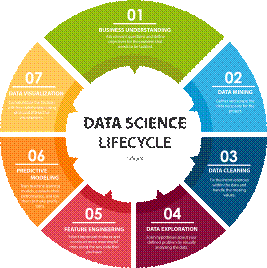




|
|
|
CONTACT 732-281-7122 / 732-423-8052 |
|
COMPUTERS-DATA-SCIENCE |
|
Data science is the study of data to extract insights that can be used to guide business decisions and strategic planning. It's a multidisciplinary field that combines principles from mathematics, statistics, artificial intelligence, and computer engineering to analyze large amounts of data. Data scientists use modern tools and techniques to find patterns, derive information, and build predictive models.
Data scientists are responsible for:
Developing strategies for analyzing data Preparing data for analysis Exploring, analyzing, and visualizing data Building models with data using programming languages Deploying models into applications Data scientists often work in teams that include business analysts, data engineers, IT architects, and application developers. |
|
Data science is often considered the twenty-first century's most lucrative career pathway, pivotal to organizations' operations and service delivery worldwide. With the demand for data scientists soaring globally, educational institutions strive to cater to this need.
Key Takeaways:
Data science plays a critical part in business operations and organizations’ decision-making processes.
Get an in-depth view of the comprehensive syllabus covering essential subjects and topics in Data Science.
RABISLIST.COM Data Scientist program offers practical experience and industry-recognized certification.
A Data Science program equips learners with the ability to manipulate structured and unstructured data through various tools, algorithms, and software, emphasizing the development of critical Data Science skills. It is essential for participants to understand the data science course outline, which includes the acquisition of these skills, before choosing an educational establishment.
The foundational subjects of any data science curriculum or degree encompass Statistics, Programming, Machine Learning, Artificial Intelligence, Mathematics, and Data Mining, regardless of the course's delivery mode.
While the data science syllabus remains consistent across various degrees, the projects and elective components may vary. For instance, the B.Tech., Data Science syllabus, compared to the B.Sc., in Data Science, also includes practical labs, projects, and thesis work. Similarly, the M.Sc., in Data Science emphasizes research-oriented studies, including specialized training and research initiatives.
What Is a Data Science Program? Students pursuing data science gain comprehensive insights into handling diverse data types and statistical analysis. The curriculum is structured to ensure students acquire a deep understanding of various strategies, skills, techniques, and tools essential for managing business data effectively. The courses offer focused education and training in areas such as statistics, programming, algorithms, and analytics. Through this training, students develop the skills necessary to uncover solutions and contribute to impactful decision-making. These students become adept at navigating different data science roles and are thoroughly equipped to be recruited by leading companies.
Best Data Science Program Subjects The best data science programs are designed to equip students with robust skills and knowledge, preparing them for the dynamic field of data science. These programs cover a comprehensive curriculum that spans technical subjects, theoretical foundations, and practical applications. Here’s a detailed look at some of the core subjects that are crucial for any top-tier data science program:
1. Statistics and Probability Understanding statistics and probability is fundamental to data science. This subject covers descriptive statistics, inferential statistics, probability distributions, hypothesis testing, and statistical modeling. Mastery in statistics allows data scientists to analyze data effectively, make predictions, and infer insights from data.
2. Programming An essential skill for data scientists. Python and R are the most common languages due to their simplicity and the powerful libraries they offer for data analysis (like Pandas, NumPy, Matplotlib, Seaborn in Python, and ggplot2, and dplyr in R). A good data science program will cover programming fundamentals, data structures and algorithms, and software engineering principles.
3. Machine Learning It teaches computers to learn from data and make decisions or predictions. Core topics include supervised learning (regression and classification), unsupervised learning (clustering, dimensionality reduction), neural networks, deep learning, reinforcement learning, and the practical application of these algorithms.
4. Data Mining and Data Wrangling Data mining extracts valuable information from large datasets. This subject covers data preprocessing, data cleaning, data exploration, and the use of algorithms to discover patterns and insights. Data wrangling focuses on transforming and mapping data from its raw form into a more suitable format for analysis.
5. Databases and Big Data Technologies Knowledge of databases is crucial for managing data. This includes understanding relational databases (SQL), NoSQL databases, and big data technologies such as Hadoop, Spark, and cloud storage solutions. These tools help efficiently store, retrieve, and process large volumes of data.
6. Data Visualization It is the graphical representation of information and data. It uses visual elements like charts, graphs, and maps to see and understand data trends, outliers, and patterns. Tools like Tableau and Power BI and programming libraries such as Matplotlib and ggplot2 are commonly taught.
7. Ethics and Data Privacy With great power comes great responsibility. Data science programs also address the ethical considerations and legalities surrounding data privacy, data protection, and bias in machine learning models. Understanding these aspects is critical to ensuring that data science practices are ethical and respectful of user privacy.
8. Domain-Specific Applications Many programs offer courses tailored to specific industries like healthcare, finance, or marketing. These courses focus on applying data science techniques to solve industry-specific problems, offering students insights into how data science can drive decision-making in various fields.
Electives and Specializations Top programs often allow students to specialize in areas of interest through electives. These might include advanced machine learning, artificial intelligence, natural language processing, computer vision, or robotics.
Projects and Capstones Hands-on projects and capstone courses are integral to applying what students have learned in real-world scenarios. They provide practical experience in problem-solving, data analysis, and model development, preparing students for the challenges they will face in their careers.
|
